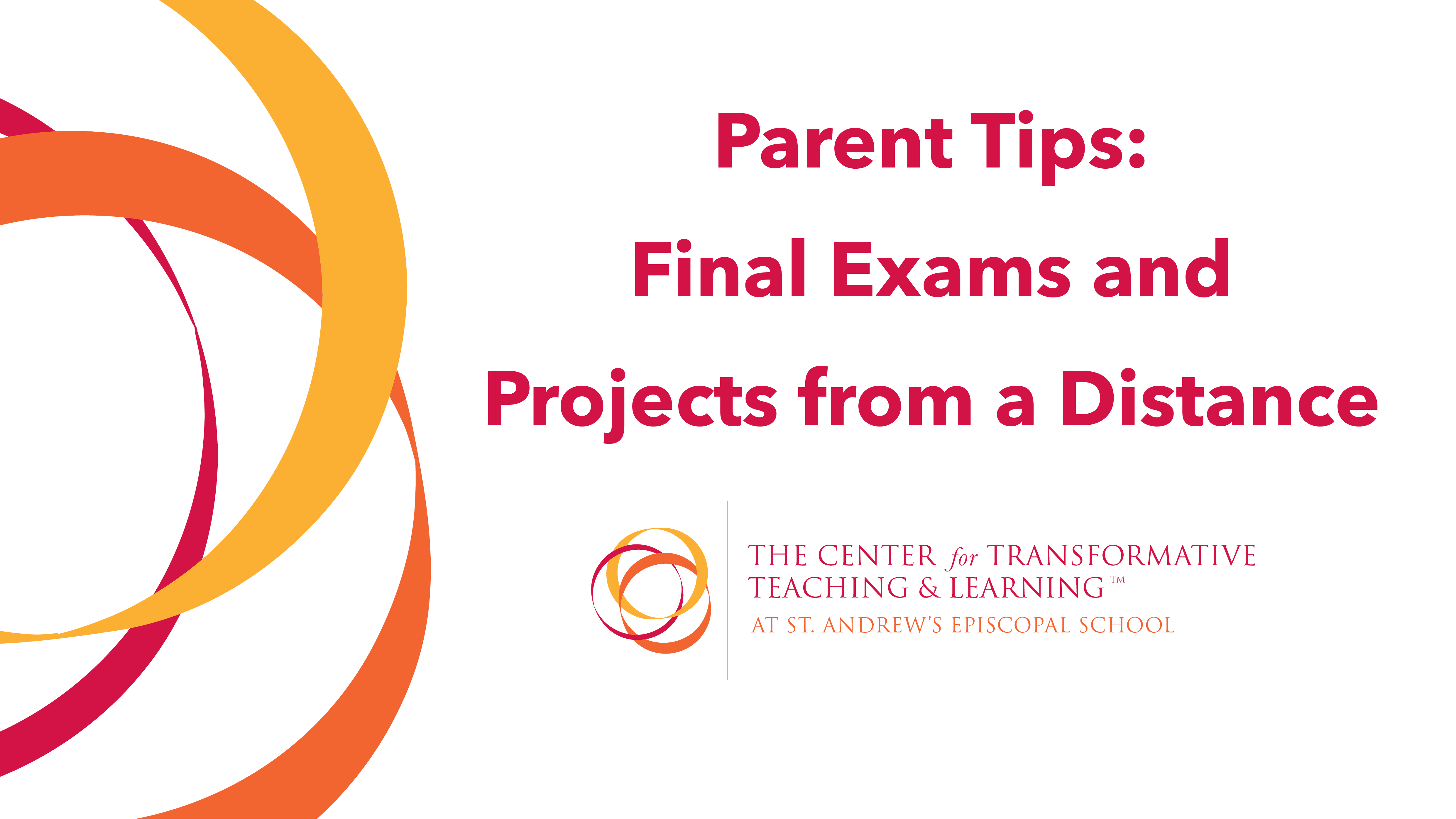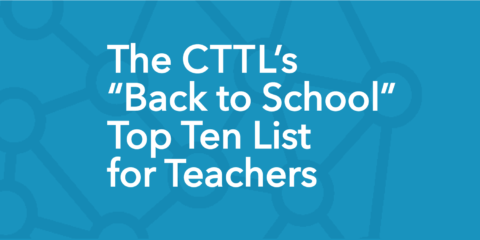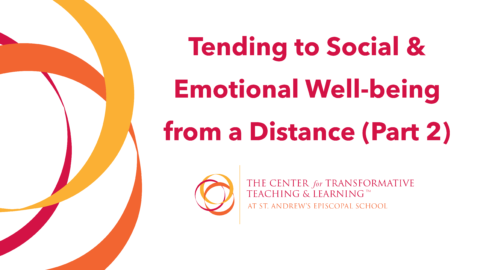By Dr. Ian Kelleher
One thing that hasn’t changed in this topsy-turvy learning world is the sudden arrival of that “the end is coming!” feeling. After seeming like a long way off for so long, the end of the school year is now staring at us like a sun-drenched child at an ice cream truck. The final weeks will bring final exams and projects. And although they will likely look a little different this year, we can make some suggestions to help you help your child.

PREPARING FOR EXAMS
Research suggests that left to their own devices, students tend to do a bad job when it comes to choosing effective, efficient study strategies. The strategies that tend to feel the best, like rereading notes or the textbook, are actually some of the worst at building lasting memory. The strategies that work better, like retrieval practice, do not feel good because you spend a lot of time getting things wrong and not being able to remember.
One of the best strategies of all, spacing your practice rather than cramming, sounds simple, but in practice is really hard to do — it takes a degree of organization and self-regulation that many children do not have yet. This is not a condemnation of the child, it is just where they are developmentally. They are still of an age where they are novice learners, and novice learners need different structures in place to help them thrive. So what can you do to help? Begin by learning what the good strategies are.
1. Retrieval practice
Retrieval practice should be your child’s go-to strategy, not rereading. They should practice in ways where they generate answers, solutions, or content, and not simply reread their notes or textbook. But they will likely prefer rereading. However, no matter how many highlighters they use, rereading is not as good as retrieval practice. The act of trying to recall information, to generate answers or content, helps long-term learning more — even if it feels harder, even if it is a struggle. Since it feels worse, we need to support, encourage, and cajole each child to engage in the struggle of retrieval practice, because it is precisely this effortful struggle that makes it effective.
2. Explain it to yourself or someone else
Explaining what you are trying to learn to yourself or to someone else can be done in a variety of ways: words out loud, recording yourself on your phone, drawing, even making a simple video. You child can keep what they create to themselves or share with you or friends. This act of generating understanding can be very helpful in creating lasting memory, but it can also help your child identify places where they do not know the material as well as they thought, and where more studying or seeking a teacher might be necessary.
3. Connect knowledge islands to form knowledge webs
Help your child connect knowledge together into coherent patterns that make sense to them. Students often see the knowledge and skills in a subject as isolated islands, not a coherent, connected web. It is part of being a novice learner, but it makes it harder to remember, so help your child make connections. Activities like creating visual maps, either by hand or using websites like MindMeister, MindMup or bubbl.us, can help. When your child is studying using flashcards, suggest to them that they add a sentence to each one that connects the card to another idea in the course.
4. Spaced practice
Allowing some forgetting — allowing yourself to get a bit rusty, then trying to retrieve the knowledge or skill again — really helps long term learning. But children tend to be really bad at organizing the spacing themselves. Is there a way you can help them create this structure? For example, help them create a study timeline from now to the end of the year, or print out an empty calendar which they can fill in with, say, three subjects to study each day. Children also tend to be bad at self-regulating themselves to stick to the spaced practice timeline, so if you create a timeline, be prepared for more supporting, encouraging, and cajoling. Remember, spacing is one of the best things your child can do to study.
5. What study strategy when?
As novice learners, students are still figuring out how to use the best study strategy at the best time. Students are often not as good at figuring this out themselves as their teachers think. And they are often not as good at automatically taking a strategy that worked well in one place and using it somewhere new. So help your child brainstorm different strategies to study for the different parts of their exams. One question to ask is, What are some study strategies that have worked in other subjects? Or earlier in the year?
6. Avoid “arts and crafts studying”
One of our favorite researchers, David Daniel, coined the phrase “arts and crafts studying” to describe study materials that look beautiful but have little impact. While some amount of beautification and design can make studying more enjoyable or satisfying, students need to find balance. As a student once wrote in a reflection to me, “If I hadn’t spent so much time making flash cards for the test, I would have had enough time to study for the test.”
PROJECTS
7. Help with executive functioning skills
The stress, strangeness, and home learning situations of students can mean that executive functioning challenges can be greater than for regular “at school” classes. And some children who didn’t appear to struggle with executive functioning skills may struggle now. Be aware that your child may struggle more this year. See this piece by us for more about executive functioning and distance learning.
8. More help with executive functioning skills
Help your child plan the timeline of a project. Help them set checkpoints through the project where they need to have a specific thing done by a given date. Have them dictate a self-check rubric to you that they can use help to determine whether they have met the criteria of the project and are ready to hand it in. Set an alarm on your phone for “Check to make sure that you have submitted X project” (finishing and submitting are two different steps, and students need to make sure that both are done).
9. Self advocacy
Self advocacy is more important but often harder to do during distance learning, so support your child more to help them get in touch with their teachers. It should still be them getting in touch, not you.
FINAL WORD
10. Emotional support
Although this one is very obvious, we need to say it. Students are facing added stress and added challenges right now. There is uncertainty in many students’ minds about what summer is going to be like — in part because school brings social connection, goofy stories to share, and daily structure; what happens when these go? The end of this year is probably going to be harder than usual. Every child needs our emotional support now more than ever.
Want more strategies?
I was reminded last week of the excellent book by Mark McDaniel et al, Make it Stick, and if you want to take a deeper dive into memory strategies, the research behind them, and some stories of what they look like, I highly recommend it.
Ice cream is one of my greatest loves in the world. My favorite all time flavor is Toscanini’s burnt caramel, Central Square, Cambridge, Massachusetts. Some of you may know it. If not, wow, what a treat you have in store. So please, when lockdown is over, if you ever find yourself in Toscanini’s, and you should, take a picture and send it to me: ikelleher@saes.org.
Dr. Ian Kelleher is a science teacher at St. Andrew’s Episcopal School, and Head of Research for its Center for Transformative Teaching & Learning. His work focuses on helping teachers translate the science of learning into everyday practices in their own classrooms, and measuring the impact. Ian is the co-author of “Neuroteach: Brain Science and the Future of Education,” and co-designer of Neuroteach Global. Ian is the the inaugural Joseph and Kathleen Dreyfuss Faculty Chair for Research, an endowed position at St. Andrew’s Episcopal School for the lead CTTL researcher.




